Systems engineers are the architects of complex systems, ensuring that all components work together seamlessly. They play a critical role in designing, integrating, and managing intricate systems that meet specific requirements and function reliably over time.
Skills required for a systems engineer include a strong foundation in systems design, integration, and troubleshooting, as well as proficiency in tools and methodologies like systems modeling, simulation, and project management. Additionally, soft skills such as communication and teamwork are essential for collaborating with various stakeholders.
Candidates can write these abilities in their resumes, but you can’t verify them without on-the-job Systems Engineer skill tests.
In this post, we will explore 8 essential Systems Engineer skills, 10 secondary skills and how to assess them so you can make informed hiring decisions.
Table of contents
8 fundamental Systems Engineer skills and traits
The best skills for Systems Engineers include Systems Analysis, Technical Documentation, Problem Solving, Project Management, Risk Management, Software Development, Network Configuration and Security Protocols.
Let’s dive into the details by examining the 8 essential skills of a Systems Engineer.
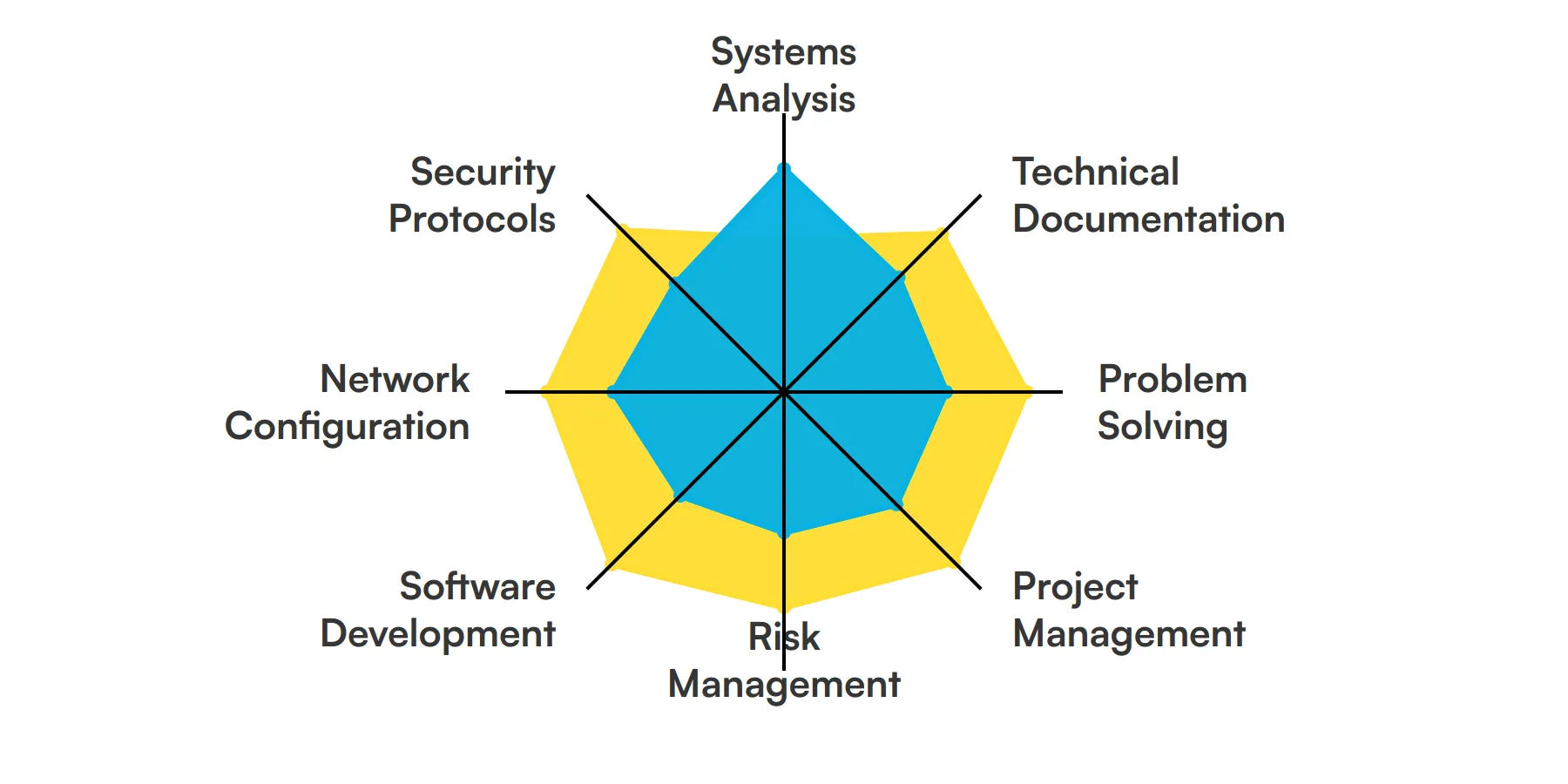
Systems Analysis
Systems analysis is fundamental for a Systems Engineer, involving the evaluation of complex systems to identify potential improvements or integration issues. This skill allows the engineer to understand and map out system architectures, ensuring all components work harmoniously and meet business requirements.
For more insights, check out our guide to writing a System Analyst Job Description.
Technical Documentation
Creating clear and comprehensive technical documentation is a key skill for Systems Engineers. This documentation serves as a blueprint for system design, deployment, and maintenance, ensuring that all team members and stakeholders have a clear understanding of the system's workings and specifications.
Problem Solving
Problem solving is critical in the role of a Systems Engineer, who must frequently address and resolve system malfunctions or inefficiencies. This skill involves diagnosing issues, proposing effective solutions, and implementing fixes to ensure system stability and performance.
Check out our guide for a comprehensive list of interview questions.
Project Management
Systems Engineers often lead projects, making project management skills essential. They plan, execute, and oversee projects to ensure they are completed on time, within budget, and according to specifications, coordinating between different teams and stakeholders.
Risk Management
Identifying, analyzing, and mitigating risks in system development and integration are crucial responsibilities for a Systems Engineer. This skill helps in foreseeing potential problems and implementing strategies to prevent system failures or security breaches.
For more insights, check out our guide to writing a Risk Analyst Job Description.
Software Development
Understanding software development processes and methodologies is necessary for Systems Engineers, as they often work closely with software teams to integrate and deploy systems. This skill ensures that the engineer can contribute effectively to coding, debugging, and development discussions.
Network Configuration
Network configuration skills are essential for Systems Engineers tasked with setting up, managing, and maintaining networks. This includes configuring network hardware and software, ensuring reliable network performance and security.
Check out our guide for a comprehensive list of interview questions.
Security Protocols
A Systems Engineer must be proficient in implementing and managing security protocols to protect data and maintain system integrity. This involves understanding current security threats and deploying appropriate countermeasures.
10 secondary Systems Engineer skills and traits
The best skills for Systems Engineers include Communication, Adaptability, Analytical Thinking, Customer Focus, Time Management, Continuous Learning, Collaboration, Quality Assurance, Vendor Management and Resource Allocation.
Let’s dive into the details by examining the 10 secondary skills of a Systems Engineer.
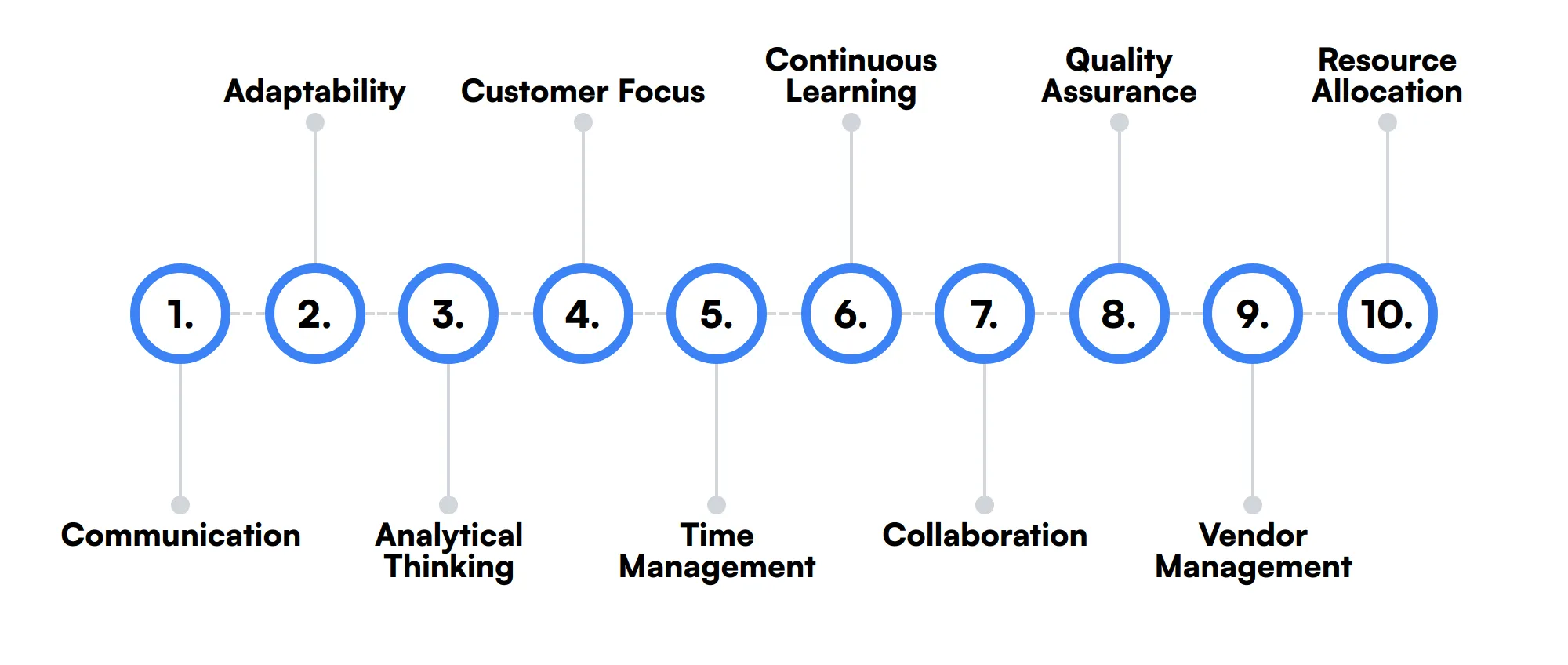
Communication
Effective communication is necessary for Systems Engineers to convey technical information to non-technical stakeholders and collaborate with team members across different departments.
Adaptability
The technology landscape is constantly evolving, and Systems Engineers need to adapt quickly to new tools and technologies to remain effective in their roles.
Analytical Thinking
Systems Engineers must analyze data and system performance metrics to make informed decisions about system enhancements and optimizations.
Customer Focus
Understanding and meeting the needs of customers, whether internal or external, is important for Systems Engineers to ensure the systems meet user requirements.
Time Management
Efficient time management allows Systems Engineers to juggle multiple projects and responsibilities, ensuring timely delivery of system components.
Continuous Learning
The field of systems engineering is ever-changing, necessitating ongoing education and skill development to keep up with new technologies and methodologies.
Collaboration
Working effectively with other engineers, developers, and business units is crucial for the successful design, implementation, and maintenance of systems.
Quality Assurance
Systems Engineers need to ensure that all aspects of the system function correctly and meet predefined quality standards before deployment.
Vendor Management
Dealing with external vendors for software and hardware needs is a common part of a Systems Engineer's role, requiring negotiation and management skills.
Resource Allocation
Efficiently managing resources, whether human, financial, or technological, is key to maintaining project timelines and budgets in systems engineering.
How to assess Systems Engineer skills and traits
Assessing the skills and traits of a Systems Engineer involves a multifaceted approach, as the role encompasses a broad range of technical and managerial capabilities. From Systems Analysis to Security Protocols, each skill plays a critical role in ensuring that complex systems are designed, implemented, and maintained effectively.
While resumes provide a snapshot of a candidate's background, they often fall short in demonstrating how well an individual can handle real-world challenges. This is where practical assessments come into play. By incorporating scenario-based evaluations and problem-solving exercises, employers can get a clearer picture of a candidate's capabilities in Project Management, Risk Management, and other critical areas.
For a more streamlined and effective assessment process, many organizations turn to Adaface. With tools designed to evaluate a range of technical skills, from Software Development to Network Configuration, Adaface assessments can help you achieve a 2x improvement in the quality of your hires. Learn more about crafting the perfect Systems Engineer assessment at Adaface.
Let’s look at how to assess Systems Engineer skills with these 6 talent assessments.
Windows System Administration Online Test
Windows System Administration Online Test evaluates candidates on their ability to manage and troubleshoot Windows servers and networks. The test focuses on practical skills in areas such as Active Directory, Group Policy, and PowerShell scripting.
The test assesses candidates on Windows Server configuration, network services management, and system security protocols. It also evaluates their scripting abilities to automate tasks and enhance system efficiencies.
Candidates who perform well demonstrate a strong grasp of server and network security, as well as the ability to implement advanced Windows administration and scripting solutions.
Problem Solving Test
Problem Solving Test measures a candidate's ability to analyze complex situations and devise effective solutions. The test covers a range of reasoning skills, including logical, spatial, and abstract reasoning.
This test challenges candidates to interpret data, recognize patterns, and apply logical deductions under various scenarios. It aims to reveal their approach to solving problems and adapting to new information.
High-scoring individuals are adept at navigating through complex problem scenarios, demonstrating strong analytical skills and decision-making capabilities.
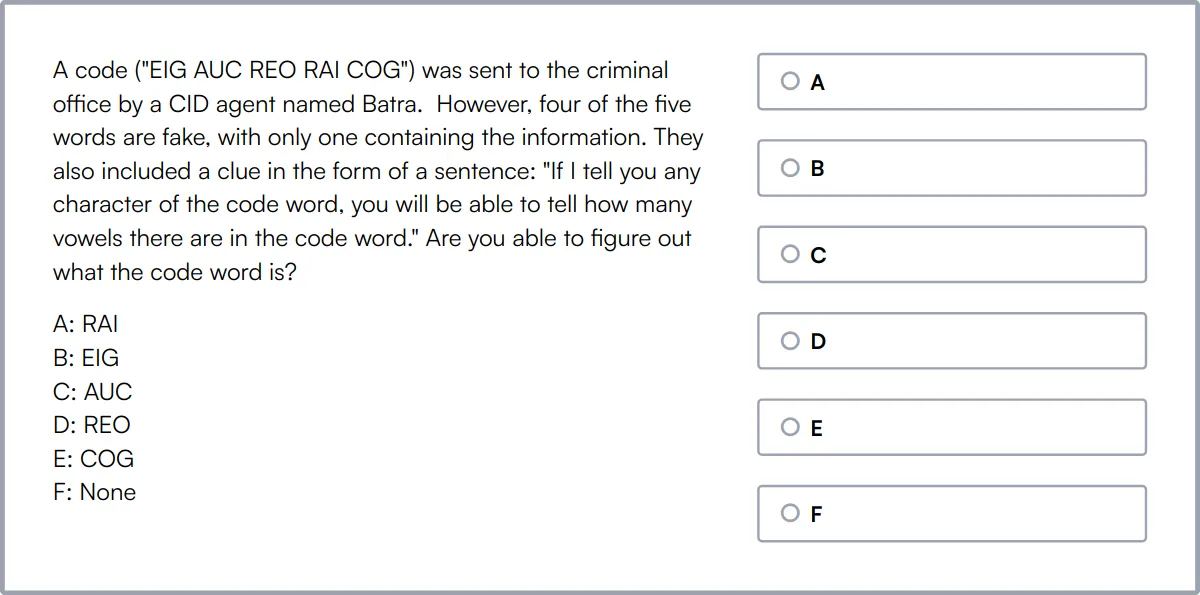
Project Management Test
Project Management Test assesses a candidate's ability to oversee projects from initiation to completion. It evaluates skills in budgeting, risk management, and stakeholder engagement.
The test examines proficiency in designing project plans, managing resources, and handling changes. It also tests knowledge of both agile and traditional project management methodologies.
Successful candidates can effectively manage project timelines and resources, ensuring that project goals are met while navigating the complexities of team and stakeholder dynamics.
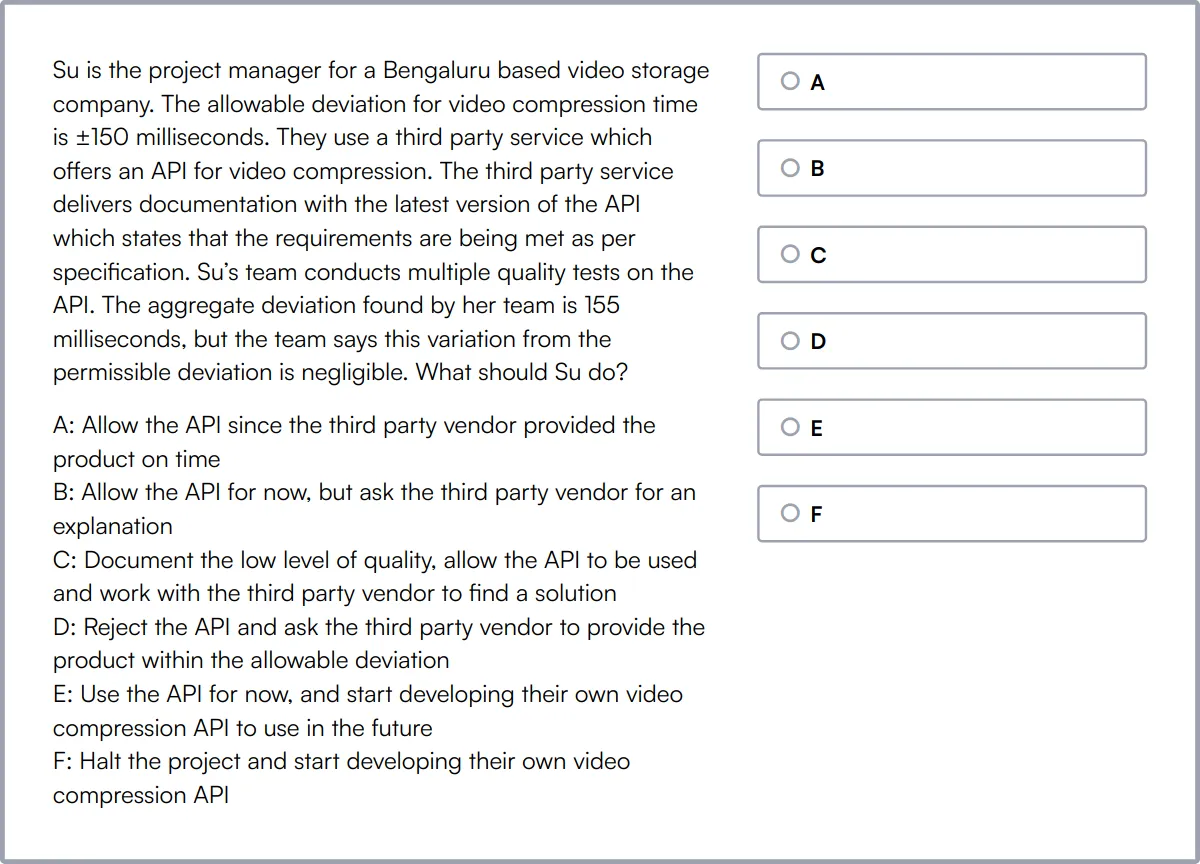
Selenium Online Test
Selenium Online Test gauges a candidate's expertise in using Selenium for web automation testing. It tests abilities in framework development, cross-browser testing, and performance optimization.
The test evaluates knowledge of Selenium Webdriver features, API testing, and the creation of robust testing frameworks. Candidates are also tested on their ability to interact with database components for comprehensive testing solutions.
Candidates excelling in this test demonstrate proficiency in automating web testing processes, enhancing testing accuracy, and developing scalable test frameworks.
Network Engineer Online Test
Network Engineer Online Test assesses a candidate's technical knowledge in designing, implementing, and managing network infrastructures. It covers areas such as network protocols, security, and troubleshooting.
This test challenges candidates on their understanding of routing, switching, and network performance optimization. It also evaluates their skills in managing both LAN and WAN environments.
Well-performing candidates demonstrate a deep understanding of network architecture and the ability to efficiently resolve complex network issues.
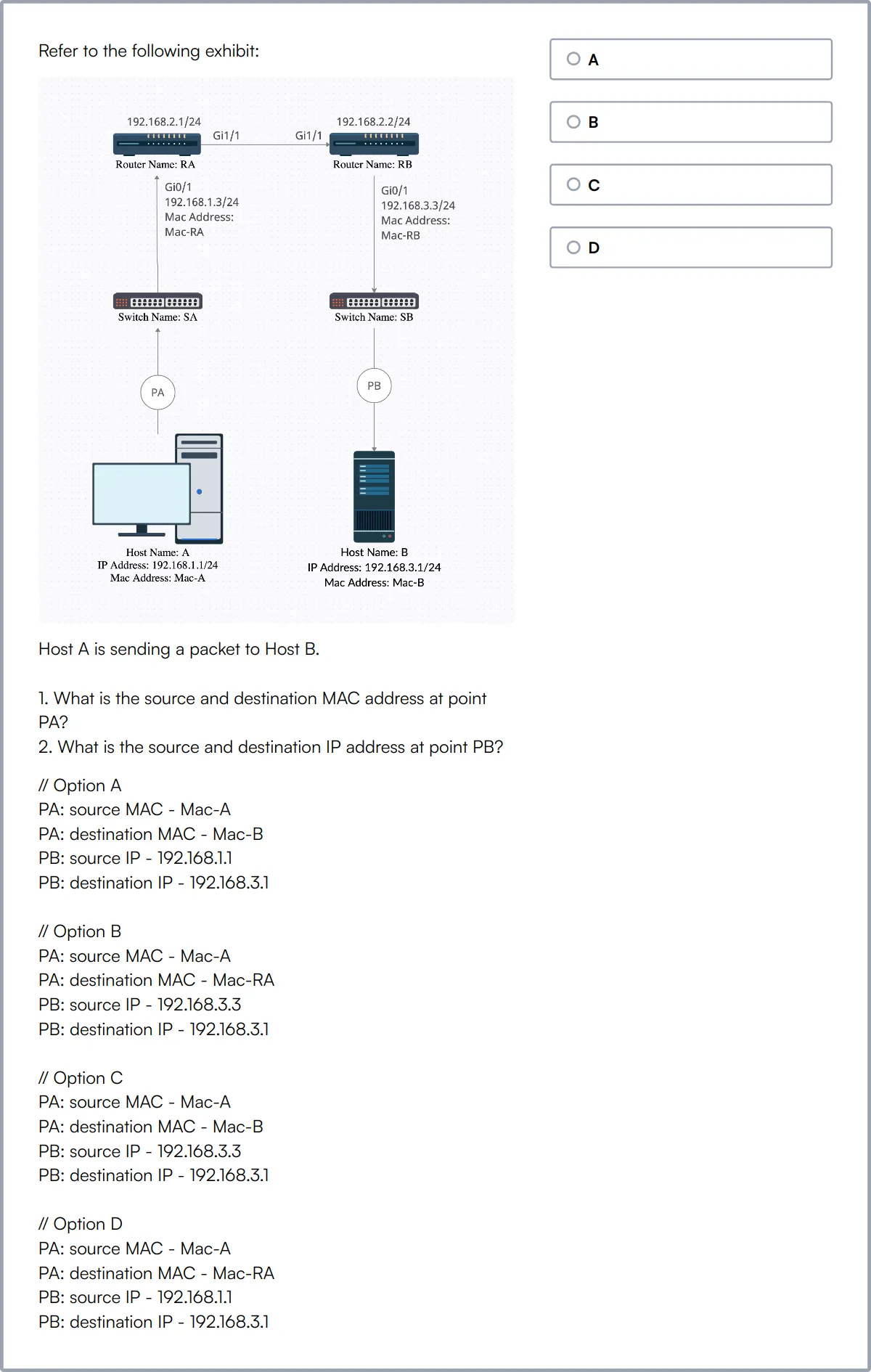
Cyber Security Assessment Test
Cyber Security Assessment Test evaluates candidates on their ability to secure networks and systems against cyber threats. It tests knowledge in areas such as cryptography, network security, and risk assessments.
The test assesses the candidate's skills in identifying and mitigating security vulnerabilities, implementing cybersecurity defenses, and conducting network penetration tests.
Candidates who score well are proficient in developing strategies to protect against advanced cyber threats and ensuring data integrity and confidentiality.
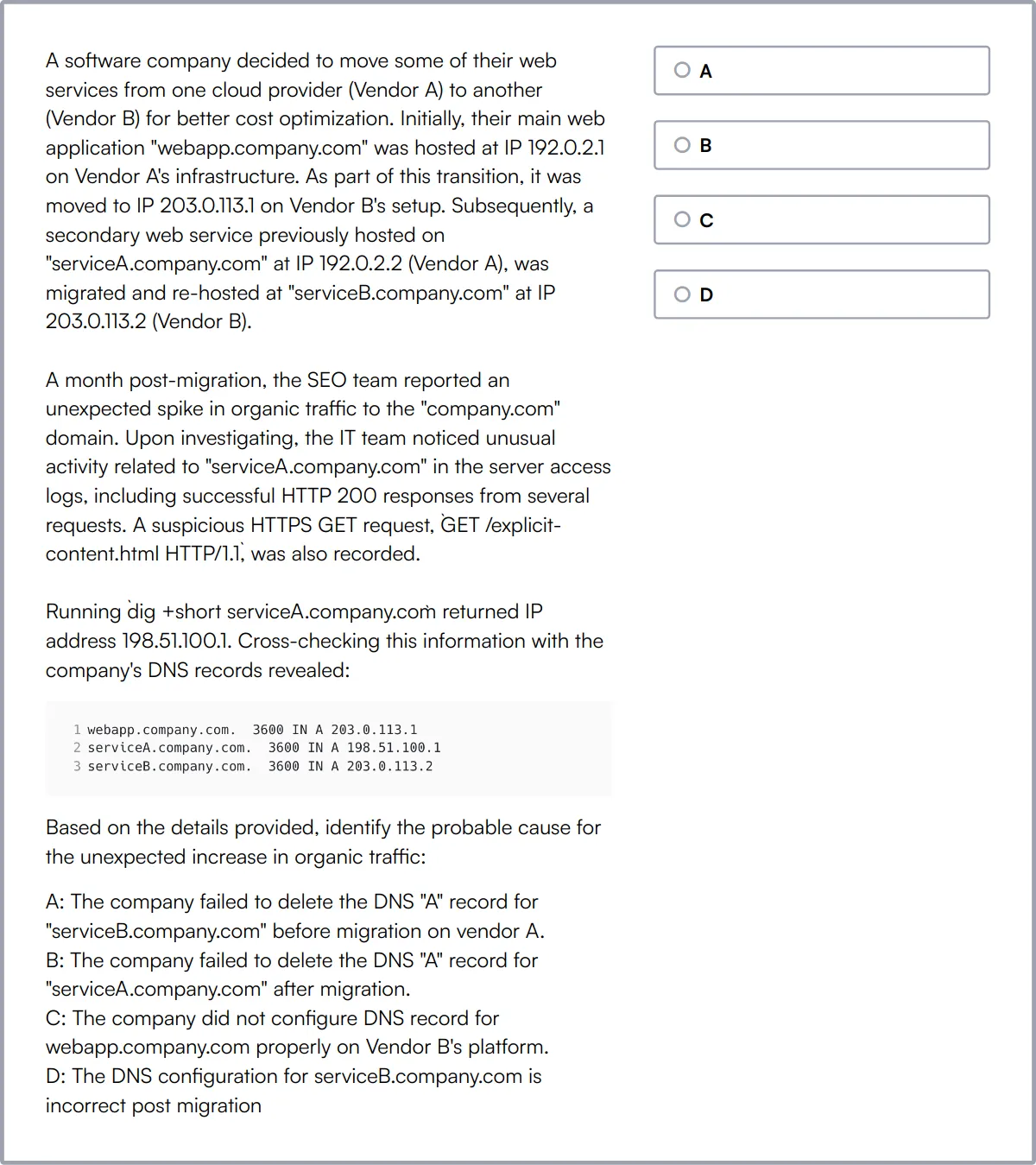
Summary: The 8 key Systems Engineer skills and how to test for them
| Systems Engineer skill | How to assess them |
|---|---|
| 1. Systems Analysis | Evaluate how effectively a candidate analyzes and improves system performance. |
| 2. Technical Documentation | Assess ability to create clear, comprehensive system documentation. |
| 3. Problem Solving | Review candidate's approach to solving complex system issues. |
| 4. Project Management | Check how a candidate plans, executes, and finalizes projects. |
| 5. Risk Management | Determine ability to identify, assess, and mitigate potential risks. |
| 6. Software Development | Gauge proficiency in coding, debugging, and software deployment. |
| 7. Network Configuration | Examine skills in setting up and maintaining network systems. |
| 8. Security Protocols | Test knowledge and implementation of cybersecurity measures. |
Computer Systems Architecture Test
Systems Engineer skills FAQs
What are the key skills required for a Systems Engineer?
Key skills include Systems Analysis, Technical Documentation, Problem Solving, Project Management, Risk Management, Software Development, Network Configuration, and Security Protocols.
How can recruiters assess a candidate's Systems Analysis skills?
Recruiters can use case studies or real-world scenarios to evaluate how candidates analyze and design system requirements and workflows.
What methods can be used to evaluate a candidate's Problem Solving abilities?
Problem-solving skills can be assessed through technical interviews, coding challenges, or situational judgment tests.
Why is Technical Documentation important for a Systems Engineer?
Technical Documentation ensures that system designs, configurations, and processes are well-documented, making it easier for teams to understand and maintain systems.
How can a candidate's Project Management skills be assessed?
Project Management skills can be evaluated by reviewing past project experiences, asking about methodologies used, and discussing how they handle timelines and resources.
What is the significance of Risk Management in Systems Engineering?
Risk Management helps identify, assess, and mitigate potential risks that could impact system performance, security, or project timelines.
How do you assess a candidate's ability to work with Security Protocols?
Assess their knowledge of security standards, past experiences with implementing security measures, and their approach to handling security incidents.
What role does Continuous Learning play in a Systems Engineer's career?
Continuous Learning ensures that Systems Engineers stay updated with the latest technologies, methodologies, and industry best practices.

40 min skill tests.
No trick questions.
Accurate shortlisting.
We make it easy for you to find the best candidates in your pipeline with a 40 min skills test.
Try for freeRelated posts
Free resources



